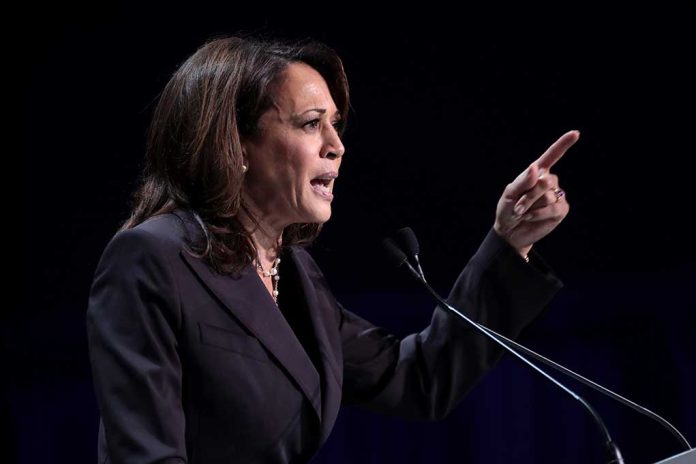
Vice President Kamala Harris stumbles through ’60 Minutes’ interview, leaving both conservatives and democrats questioning her ability to lead.
At a Glance
- Harris’s ’60 Minutes’ interview criticized for lack of clarity on crucial issues
- VP’s responses on immigration and domestic policy deemed vague and ineffective
- Comparison to Trump’s media approach highlights Harris’s potential shortcomings
- Interview aired less than a month before the U.S. presidential election
- Harris’s economic plan would increase U.S. deficit by $3 trillion, funded by taxing the wealthy
Harris Falters on Prime Time Stage
In a recent ’60 Minutes’ interview, Vice President Kamala Harris’s performance left much to be desired, raising serious questions about her competence and readiness for higher office. As the Biden administration faces mounting criticism, Harris’s inability to articulate clear, decisive answers on pressing issues like immigration and domestic policy has only fueled conservative skepticism about the Democratic leadership.
The interview, part of Harris’s increased media presence amid criticism of her limited public appearances, showcased a stark contrast between her fumbling responses and the sharp, incisive questioning of veteran journalist Bill Whitaker. This disparity has led many to question whether Harris possesses the necessary media savvy and policy depth to effectively represent the administration on the national stage.
Immigration Woes and Economic Missteps
When confronted about the ongoing immigration crisis, Harris attempted to deflect blame onto former President Trump and obstructionist Republicans. Her claim that she and Biden have reduced illegal immigration by half rings hollow in the face of the chaos unfolding at our southern border. This disconnect between rhetoric and reality underscores the administration’s failure to address one of the nation’s most pressing concerns.
Moreover, Harris’s defense of an economic plan that would increase the U.S. deficit by a staggering $3 trillion, to be funded by taxing the wealthy, demonstrates a reckless approach to fiscal policy. This proposal, coming at a time when American families are struggling with inflation and economic uncertainty, showcases the Democrats’ disconnect from the financial realities facing everyday citizens.
A Study in Contrasts: Harris vs. Trump
The Vice President’s lackluster performance stands in stark contrast to former President Donald Trump’s media prowess. While Trump’s approach was often controversial, his ability to command attention and articulate his vision with clarity and conviction is sorely lacking in Harris’s public appearances. This disparity becomes even more apparent as the nation approaches a critical election.
"60 Minutes" challenges Kamala Harris' economic plan for the "real world."
What do you think of her response? pic.twitter.com/DTU0CYhHOl
— Caleb Parke (@calebparke) October 7, 2024
Trump’s decision to decline the ’60 Minutes’ invitation, later disputing CBS’s claim that he had agreed to an interview, demonstrates a strategic understanding of media engagement that seems to elude the current administration. While Harris struggles to navigate softball questions, Trump continues to set the narrative, even from outside the halls of power.
The Stakes for America’s Future
As the 2024 election looms just 29 days away, the contrast between the Harris-Biden ticket and the potential return of Trump to the White House couldn’t be clearer. Harris’s fumbling attempts to defend her changing positions on issues like fracking and immigration, coupled with her vague platitudes about consensus-building and compromise, paint a picture of an administration adrift and ill-equipped to face the challenges of our time.
The American people deserve leadership that can articulate a clear vision for the country’s future and defend it under scrutiny. Harris’s ’60 Minutes’ performance suggests that she, and by extension the Biden administration, may not be up to that task. As conservatives, we must remain vigilant and continue to hold our leaders accountable, ensuring that the voice of reason and fiscal responsibility is heard amidst the cacophony of progressive rhetoric.






















